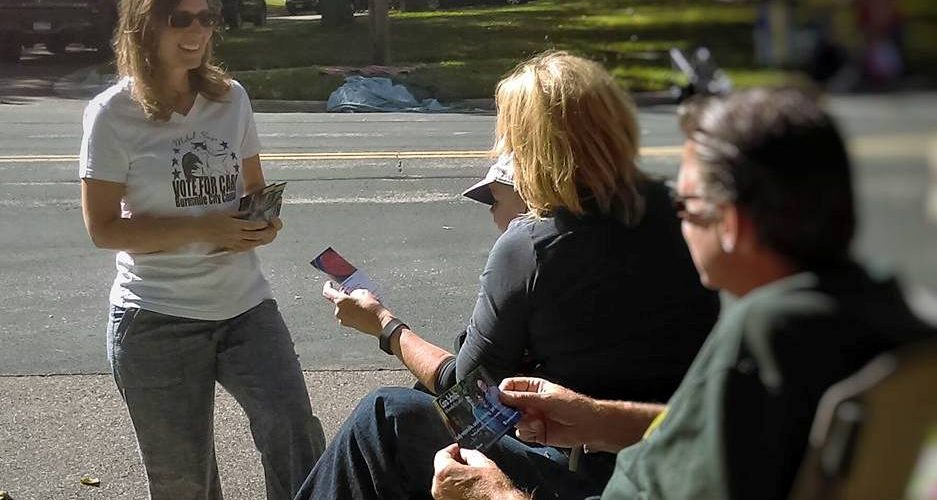Top 12 Campaign Activities
Top 12 Campaign Activities

The first six items below are essential to maximize the success of your Libertarian campaign:
1. Get your name on the ballot!
This is job #1. Your campaign does not exist unless you’re on the ballot. Learn more here.
2. Fill out, correctly and on time, all required legal paperwork
It’s a hassle, and as Libertarians, we see campaign reporting as just more government red tape. But what’s worse is a news story about you being fined for not filling out a form correctly, or filing it late. This is when you need to cross every “t” and dot every “i.” Learn more here.
3. Get a professional-quality photo of yourself.
All campaigns need a quality photo to identify yourself to voters and the media. A photo should be included in any press releases or communiques sent to the media. It will increase the chances of newspaper coverage and help voters remember who you are. Learn how to get a good head shot here.
4. Put up a campaign website.
At a minimum, it should include your photo, the office you seek, a brief description of your Libertarian Solutions and their benefits, a short bio, and a way for the media to contact you or someone who can respond on your behalf.
5. Return all media calls promptly
The opportunity for no-cost media exposure is one of the biggest reasons to run for office. If you do not return calls quickly, this taints the reporter’s view, not only of your campaign, but of Libertarians in general.
If you don’t have time, or don’t feel prepared enough to respond properly to media inquiries, look for someone in your state party who can respond on your behalf.
Use email, rather than talk live with reporters, whenever possible. This gives you, or your spokesperson, time to craft an articulate response that stays on your Libertarian message.
Be sure you, or your spokesperson, is adequately prepared to respond to media inquiries by reading Game-Changing Libertarian Communications.
6. Answer key candidate surveys you receive
Some candidate surveys are well worth the time to complete. This includes ones that are planned for publication in a major media outlet or website (such as most League of Women Voters surveys), or that come from a single-issue group that is likely to support your campaign, such as pro-gun or anti-tax groups.
If you’re unsure whether your time is well-spent, ask the group requesting the survey exactly what they will do with your responses. Ask for a commitment to print your responses in full, unedited. Even if it’s a group that opposes your Libertarian agenda, it may bring you positive attention from your supporters. “The enemy of my enemy is my friend,” as they say.
Read Game-Changing Libertarian Communications for tips on how to keep your responses powerful, effective, and on-message. Be sure to incorporate your Libertarian Solution(s) and their resultant benefits to voters in your survey responses.
To move your campaign to the next level of engagement, add these activities:
7. Assemble a campaign team and set goals for your campaign
At a minimum, you need a treasurer. If possible, get a campaign manager, media coordinator, petition drive coordinator (if applicable), and as many other positions as you can fill.
With your team, set aggressive but realistic goals — ones that are appropriate for your expected level of activity.
Goals should include specific numbers, such as: increasing your vote totals by a certain percentage over previous Libertarian campaigns in your area (especially if the targeted percentage will achieve ballot status for the party), doing a certain number of media interviews, winning your home precinct, or increasing LP voter registrations or membership or in your area by a certain number.
Bringing in new LP members is particularly important for the LP’s long-term success and will result in more future candidates. We encourage you to include an LP membership form on any literature.
Don’t set a goal to win, and don’t make public claims that you will win, unless you (1) intend to be at least as active as your competition, (2) raise enough money to compete with them (not necessarily the same about, but a substantial portion thereof), and (3) get roughly as much media attention as they do, which means being included in all debates. For higher levels of office, and often for mid-level such as state legislature or city council in a large city, you need a lot of money just to reach voters and let them know you exist. Check campaign finance records of past candidates who ran for the office you seek. This will give you an idea of how much money is needed to have a chance to win.
8. Raise money
If you’re running a serious campaign, fundraising is essential.
Ensure you have a working, fully debugged, donation capability accessible from your website, and optionally, from your Facebook page. Once it’s live, test it whenever you make changes, and have someone available who can fix it quickly if it goes down.
File any additional forms required by campaign regulators (usually you must report donations over a specified limit).
It is important to send thank-you notes to donors promptly, especially major donors. They are much more likely to donate again in the future if you do. Ideally, find a volunteer who will do this for you.
Learn more about fundraising here.
9. Prepare a news release about your candidacy
Use this as a way to introduce yourself to local reporters. If your campaign covers only a small area, hand deliver as many press releases as possible (along with your photo) and make personal contact with the reporters and editors who are likely to cover you.
You may also wish to prepare a press kit. This should include your photo, your announcement news release, a list of short quotes from you on the issues you’ll be stressing in your campaign, any feature stories about your campaign already published, and any endorsements you receive. You may also wish to include the LP’s literature.
This is also the stage where you should be preparing a brochure or campaign card.
10. Write a “stump” speech
This is your basic campaign speech, which explains who you are, why you’re running, and what you will do if elected. Be prepared to repeat the essence of your stump speech in most, if not all, or your public appearances to reinforce its message. This includes media interviews, debates, and talks on specific issues or to special interest groups.
Be sure to read Game-Changing Libertarian Communications, and incorporate the principles and techniques described in this guide in your speech.
If writing is not your top skill, find sometime to write a speech for you.
Be sure to practice your speech. The easiest way to get feedback is to deliver it to yourself looking at a mirror. It’s weird, but it works. Consider joining Toastmasters for more practice, which may lead to speaking engagements for your campaign.
11. Attend candidate forums, debates, and other speaking opportunities
This is another avenue for easy publicity.
For debates and forums that include your opponents, it’s not the people in the live audience that are important. They are usually candidate supporters who have already made up their minds. But these events are often covered by reporters, who will spread the message to voters who haven’t made up their minds.
Be sure you are adequately prepared before participating in any candidate forums or debates. Read Game-Changing Libertarian Communications, and allow time to practice your responses to questions likely to be posed.
At all public appearances, bring an electronic device or sign-up sheets on a clipboard to collect the names and contact info (name, email, phone, address) of anyone who supports your campaign, especially if they may volunteer or donate.
12. Canvass your district.
For most campaigns at the level of state legislature or below (and for serious US House campaigns), door knocking is essential to win or to maximize your votes. Get a team of volunteers to help. Bring door hangers that you can leave at homes where no one answers your knock. Bring an electronic device or sign-up sheets on a clipboard to collect the names and contact info of potential supporters. No sense in putting the time into going door-to-door if you skip this valuable opportunity to grow your list of supporters.



